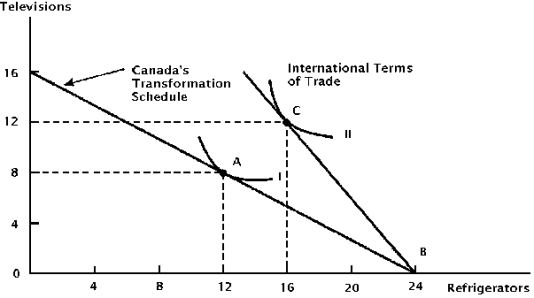Exam 2: Foundations of Modern Trade Theory: Comparative Advantage
Exam 1: The International Economy and Globalization48 Questions
Exam 2: Foundations of Modern Trade Theory: Comparative Advantage170 Questions
Exam 3: Sources of Comparative Advantage109 Questions
Exam 4: Tariffs124 Questions
Exam 5: Nontariff Trade Barriers133 Questions
Exam 6: Trade Regulations and Industrial Policies129 Questions
Exam 7: Trade Policies for the Developing Nations100 Questions
Exam 8: Regional Trading Arrangements130 Questions
Exam 9: International Factor Movements and Multinational Enterprises96 Questions
Exam 10: The Balance of Payments99 Questions
Exam 11: Foreign Exchange121 Questions
Exam 12: Exchange-Rate Determination133 Questions
Exam 13: Mechanisms of International Adjustment107 Questions
Exam 14: Exchange-Rate Adjustments and the Balance of Payments100 Questions
Exam 15: Exchange-Rate Systems and Currency Crises107 Questions
Exam 16: Macroeconomic Policy in an Open Economy72 Questions
Exam 17: International Banking: Reserves, Debt, and Risk96 Questions
Select questions type
The principle of absolute advantage asserts that mutually beneficial trade can occur even if one nation is absolutely more efficient in the production of all goods.
Free
(True/False)
4.7/5  (38)
(38)
Correct Answer:
False
According to the principle of comparative advantage, an open trading system results in resources being channeled from uses of low productivity to those of high productivity.
Free
(True/False)
4.8/5  (38)
(38)
Correct Answer:
True
Is it possible to add up the preferences of all consumers in an entire nation?
Free
(Essay)
4.8/5  (37)
(37)
Correct Answer:
No. It is impossible to make interpersonal comparisons of satisfaction, and thus it is not possible to add up preferences.
Under free trade, Canada would enjoy any gains from trade with Sweden if Canada:
(Multiple Choice)
4.9/5  (33)
(33)
According to the principle of comparative advantage, specialization and trade increase a nation's total output since:
(Multiple Choice)
4.8/5  (37)
(37)
If Argentina has a comparative advantage over Brazil in beef relative to coffee, Argentina will specialize in beef production.
(True/False)
4.8/5  (40)
(40)
Concerning international trade restrictions, which of the following is ? Trade restrictions:
(Multiple Choice)
5.0/5  (35)
(35)
In a two-product, two-country world, international trade can lead to increases in:
(Multiple Choice)
4.7/5  (43)
(43)
The expression "importance of being unimportant" suggests that if one nation is much larger than the other, the larger nation realizes most of the gains from trade while the smaller nation realizes fewer gains from trade.
(True/False)
4.9/5  (41)
(41)
Table 2.3. Terms of Trade
Export Price Index Import Price Index Country 1990 2004 1990 2004 Mexico 100 220 100 200 Sweden 100 160 100 150 Spain 100 155 100 155 France 100 170 100 230 Denmark 100 120 100 125
-Referring to Table 2.3, which country's terms of trade did between 1990 and 2004?
(Multiple Choice)
5.0/5  (40)
(40)
The dynamic gains from trade include all of the following :
(Multiple Choice)
5.0/5  (33)
(33)
Figure 2.2 illustrates trade data for Canada. The figure assumes that Canada attains international trade equilibrium at point
Figure 2.2. Canadian Trade Possibilities
 -Referring to Figure 2.2, Canada has a comparative advantage in:
-Referring to Figure 2.2, Canada has a comparative advantage in:
(Multiple Choice)
4.8/5  (34)
(34)
With increasing opportunity costs, a nation totally specializes in the production of the commodity of its comparative advantage; with constant opportunity costs, a nation partially specializes in the production of the commodity of its comparative advantage.
(True/False)
5.0/5  (41)
(41)
John Stuart Mill's theory of reciprocal demand best applies when trading partners:
(Multiple Choice)
4.8/5  (34)
(34)
The terms of trade represents the rate of exchange between a country's exports and imports.
(True/False)
4.8/5  (37)
(37)
It is possible for a nation not to have an absolute advantage in anything; but it is not possible for one nation to have a comparative advantage in everything and the other nation to have a comparative advantage in nothing.
(True/False)
4.8/5  (37)
(37)
International trade leads to increased welfare if a nation can achieve a post-trade consumption point lying inside of its production-possibilities schedule.
(True/False)
4.8/5  (34)
(34)
Ricardo's model of comparative advantage assumed all of the following except:
(Multiple Choice)
4.9/5  (32)
(32)
By reducing the overall volume of trade, import restrictions tend to reduce a nation's gains from trade.
(True/False)
4.8/5  (30)
(30)
Modern trade theory contends that the pattern of world trade is governed by
(Multiple Choice)
4.7/5  (41)
(41)
Showing 1 - 20 of 170
Filters
- Essay(0)
- Multiple Choice(0)
- Short Answer(0)
- True False(0)
- Matching(0)